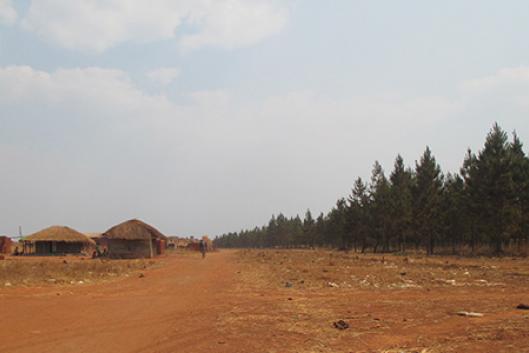On the frontlines of the promotion of monoculture tree plantations as a solution to the climate crisis, under the false pretext of ‘re-afforestation’, families affected by tree plantations in Mozambique, Tanzania and Brazil, have once again denounced the serious impacts of tree monoculture on their lives and the environment.
Resorting to promises of permanent jobs, development and the building of schools, roads and wells, eucalyptus and rubber tree plantations have taken over large tracts of rural families’ fertile lands, thus contributing to a scarcity of land for food production and an increase in hunger among communities.
At a moment when the Government of Mozambique strongly advocates and promotes the establishment of monoculture tree plantations as one of the solutions to the climate crisis under the false pretext of “re-afforestation”, representatives of families affected by tree plantations in Mozambique (from Sofala, Manica, Zambézia and Nampula provinces), Tanzania and Brazil, gathered together on September 21, the International Day of Struggle Against Monoculture Tree Plantations, have once again denounced the serious impacts of tree monoculture plantations on their lives and the environment.
Representatives from these communities also denounced the destruction of ecosystems, farms, water sources and native production systems, leading to a worsening and deepening of poverty among rural families, and the contamination of ecosystems, soils and waters as a result of the excessive and uncontrolled use of pesticides, synthetic fertilizers and agro-chemicals.
“…the eucalyptus and rubber trees have taken over and destroyed the fertile farm lands, and families today no longer have any means to feed themselves, and some no longer have anywhere to live. If eucalyptus were food, it would be much better, but it isn’t. Furthermore, the companies destroy the native trees and use chemical products that contaminate the soil and water. Wells and rivers have dried up and drinking water has become scarce.”
“When someone decides to farm lands that the company claims to be theirs, the person is intimidated and threatened. This also happens when someone makes a complaint to their local leaders or government officials.”
Moved by feelings of anguish and revulsion, the participants of the meeting of September 21 revealed that the land where they produce corn, manioc and beans constitutes their only means of survival. For this reason these communities have resisted for many years the eucalyptus monoculture plantations of the Green Resources company in Mozambique and Tanzania, of the Portucel company in Mozambique, of Investimentos Florestais de Moçambique (IFM) and the rubber monoculture plantations of the Mozambique Holdings company in Mozambique.
The appeals of the affected communities have been to a large extent ignored by the Government. Denouncements and complaints that have been presented, when answered, are dealt with lightly, minimizing at any cost the allegations and sentiment of people who face on a daily basis the harsh reality of tree monoculture within their living spaces. Despite ample evidence that none of the investments in plantations actually generated better living conditions for communities, the Government insists in promoting monoculture plantations, while refusing to recognize the numerous and already evident problems with this patently failed extractivist model.
An open letter resulted from the meeting. It can be accessed here. We ask you all to disseminate it widely.
Academic Action for the Development of Rural Communities (ADECRU - Acção Académica Para O Desenvolvimento Das Comunidades Rurai),
Environmental Justice Mozambique (JA! - Justiça Ambiental) / Friends of the Earth – Mozambique,
Montes Errego Young Combatants’ Association (AJOCME - Associação de Jovens Combatentes Montes Errego),
Tabita Mission (Missão Tabita), and
World Rainforest Movement
